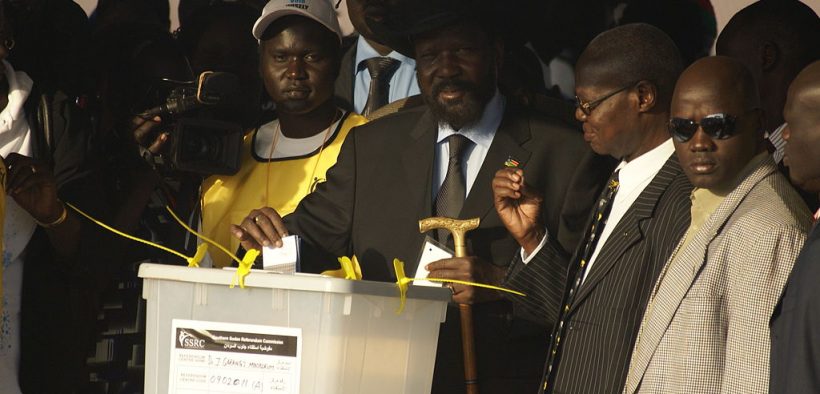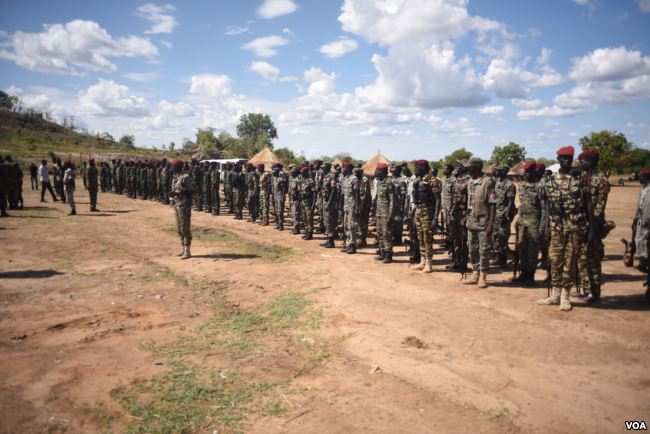US Considers Imposing Sanctions on South Sudan if New Government Not Formed

After six years of war following its independence, South Sudan is attempting to form a transitional government by November 12.
Amidst the failure of leaders in South Sudan to realize a national unity government, a U.S. official warned on Thursday that Washington may impose sanctions on South Sudan.
According to the Sudan Tribune, Bryan Hunt, director of the office of Sudan and South Sudan with the U.S. State Department, told reporters at the U.S. Institute of Peace that his administration does not want to continue to hear arguments for why more time must be given.
“If a national unity government is not formed by November 12, we are going to reconsider our relationship with South Sudan,” he said.
The senior American official, however, maintained that his country is not likely to consider imposing sanctions on South Sudan’s economy, including oil, noting that the people of South Sudan may be affected badly, due to the fact that they are partly dependent on foreign aid for survival.
However, he did not indicate what sanctions could be imposed by the American administration on South Sudan, in case the country did not achieve a national unity government.
The Wall Street Journal reported that South Sudan’s embassy in Washington did not respond to a request for comment on the American warnings.
South Sudan Says Government Will Form
In the meantime, British special representative to Sudan and South Sudan Robert Fairweather was reported by France 24 as saying that South Sudanese President Salva Kiir had assured him that the country would realize a unified government soon.
“Certainly it’s the most optimistic I had seen him,” Fairweather said.
Fairweather’s quotes came following a meeting that the British senior diplomat had held with Kiir in the capital city of Juba last week.
The United Nations Security Council advised all parties concerned in South Sudan to commit to a previously signed peace agreement in order to sort out all outstanding issues that impede the realization of a transitional national unity government.
South Sudan, which is labeled as the youngest sovereign state in the world, was established back in 20011, following more than two decades of conflict with the regime of the recently deposed Sudanese dictator president, Omar al-Bashir.
Since then, the new state has been fraught with internal conflict and descended into a war between the state’s President Salva Kiir and his former Vice President Riek Machar, rendering millions of people into starvation and abuse, including sexual mutilation and murder. Kiir accused Machar of plotting a coup against him in 2013, leading to the conflict between the two sides. Machar denied the allegations.

SPLA soldiers near Juba in 2016, shortly after the clashes in the city between followers of Riek Machar and Salva Kiir Mayardit. (Photo: Jason Patinkin, VOA, Public domain)
Five years later, both sides agreed to a peace deal that would end the conflict, which has claimed the lives of hundreds of thousands of people, displacing over 2 million others and rendering the young country in need of food aid. As part of the deal, the two sides agreed to form a transitional government by November 12 with the aim to hold elections in three years.
Prior to the outbreak of war in South Sudan, the state used to produce 350,000 barrels of oil per day. Many international firms like the Malaysian oil company Petronas and the China National Petroleum Corp have been working with the local South Sudan company, Nile Petroleum Corp.
Potential for Violence Lingers
While the truce deal between Kiir and Machar brings hope that South Sudan is moving beyond the war that has plagued the country since gaining independence in 2011, peace is tenuous and the potential for more violence lingers nearby.
“We do not predict that failure is inevitable nor necessarily imminent. However, there are plenty of signs that the hopeful outcome we describe may not come to pass,” wrote the U.S. Institute for Peace in a report detailing the potential next steps for South Sudan.
“Counting on ‘Plan A’ is not enough, even as efforts to hold the R-ARCSS signatories to their commitments remain vital. After nearly six years of brutal conflict, two security collapses in Juba, and innumerable atrocities committed by all sides, South Sudan can barely afford a scenario of merely hope for the best.
“If ‘Plan A’ does not work, it is time for a fundamentally different strategy: one that builds a public case for and puts in place the means to a leadership transition from the current generation of politicians; swiftly moves to establish accountability and investigatory mechanisms to address those most responsible for serious crimes committed during the conflict; and introduces a new, credible mediation framework, led by states other than those that have so far mediated the crisis.”











